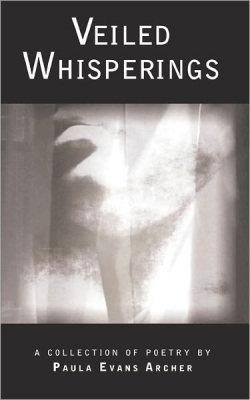Veiled Whisperings
A Collection of Poetry
Debut books of poetry often offer similar fare—first love, independence, Eros—but this volume offers a more mature perspective. Rather than first love, Paula Evans Archer examines parental love. Those seeking independence in these poems are grown children, and it is the author, in the role of parent, who is trying to offer flight despite her yearning to keep her children close. The love poems here come from long experience; rather than the first bloom of love, they evoke the perennial, not the annual.
Archer began her literary career in college, steeping herself in drama and literature at Boston College. She recently published her first novel, Unexpected Life, and she has a second book of poems due for release later this year.
Initially, this collection marks itself as the work of an amateur by virtue of its formatting; contemporary poetry books left justify the text rather than center the poems. It is hard to differentiate between the table of contents and the actual poems, as all take an identical form and the pages are not numbered. The book also uses primarily only one side of the page which interrupts the flow, suggesting section starts where none exist. Also, with twenty-six poems, the book is not the forty-eight to sixty pages typical of a full-length volume of poetry. Cumulatively, these small details suggest a lack of familiarity with the field that create a negative impression of the book in seasoned readers of poetry.
Focusing on parenthood, Archer writes as a parent amazed, terrified, joyous, and resentful. In “Birthing Break,” she writes of a mother finally alone with her newborn: “…‘Hello Sweet Child’ / Is all that I can breathe / You answer with feet / What else can you do? / Busy with birthing / A moth shedding cocoon”
The last image ends the poem as the mother amazes at what both she and her baby have been able to do. Unfortunately, lack of punctuation and a truncated representation of the child’s movement steal the poem’s potential power. In other poems, abstractions leech resonance. In “I Miss You More Than the Heart Prepared,” a mother bemoans the inevitable loss of her child to adulthood: “I should have known the day you came / Long pain; worth all the wait / Surprising beauty / Bewitching eyes / Incessant crying / Long songs the balm / Whole days of holding / Rocking closely long”
This stanza illustrates typical problems—the beauty is never realized in description and the lines suffer at the insistence of rhyme. In other poems, Archer lauds the beauty of winter, imagines her way into a decaying leaf, and praises longevity in marriage. Most poems work with a very short line, suggesting an Imagist approach, while others hark back to more traditional forms with their requisite rhyme schemes.
Certainly the book possesses moments of longing that will resonate with parents. Archer playfully interjects references to Frost, Dickinson, and Lewis Carroll, but she would do well to add some contemporary poets to her repertoire, as they would help modernize the look of her book and the efficacy of her imagery.
Reviewed by
Camille-Yvette Welsch
Disclosure: This article is not an endorsement, but a review. The publisher of this book provided free copies of the book and paid a small fee to have their book reviewed by a professional reviewer. Foreword Reviews and Clarion Reviews make no guarantee that the publisher will receive a positive review. Foreword Magazine, Inc. is disclosing this in accordance with the Federal Trade Commission’s 16 CFR, Part 255.

